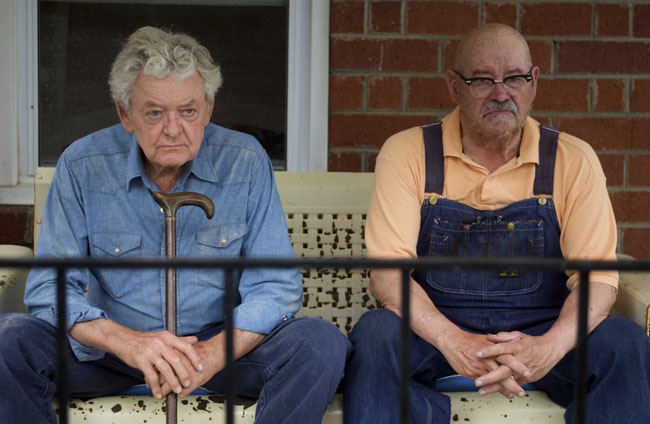CHICAGO – In anticipation of the scariest week of the year, HollywoodChicago.com launches its 2024 Movie Gifts series, which will suggest DVDs and collections for holiday giving.
Hal Holbrook Illuminates the Dying Light in ‘That Evening Sun’
 Rating: 4.5/5.0 |
CHICAGO – There are no epitaphs to be written if life is still coursing through the veins. In the film “That Evening Sun,” Hal Holbrook expresses the life coursing through him, as both a great actor and innate human being.
Holbrook portrays Tennessee farmer Abner Meecham, first seen as an old man stuck in an elder care facility. During an intriguing montage he mostly sits, disinterested in virtually every activity. He seems mentally disconnected, but suddenly in the next sequence he is packing a bag and escaping on foot from the perceived prison. The facility sends a taxi to retrieve him, but he bribes the driver to take him elsewhere.
The destination is his farm. Meecham still owns the land, but discovers some squatters living in his main house. It turns out his son (Walton Goggins) has rented the house to one of the most disliked residents of the community, Lonzo Choate (Ray McKinnon), and the squatter also has an opportunity to buy the land. Choate has a wife (Carrie Preston) and daughter (Mia Wasikowska), and is treating the farm as his new home and a way to redirect his aimless life.
Meecham refuses to leave the land he views as rightfully his, and stubbornly takes up residence in the sharecropper’s house, where the Choates have moved all his possessions. In what becomes a difficult moral wrestling match, Meecham takes on Lonzo Choate, the fretful son who wants him back in the care facility and his own rage against the dying light. Abner Meecham desires to come home.
 Photo Credit: Cooper Dunn for © Dogwood Entertainment |
There is a classic subtlety in the film because their are so many sides of what is right in the situation. There is a sympathy for ALL of the characters, even the perceived villainy of Lonzo Choates. This is a film about those hard realities of life, where people are painted into a corner of fear based on aging, their own insecurities and the dismissal of others based on preconceived generalities.
Is it possible that the 83 year old (at the time) Hal Holbrook has created his greatest character this late in his distinguished and unforgettable career? His Abner Meecham is ball of contradictions who won’t allow himself to clear his head regarding the matter of his land. His expressionless face, unchanged even with a smile, represents a generation of men whose contributions were measured by what they provided for their family, which didn’t necessarily include an emotional buy-in.
Meecham’s revenge motivation is a seething anger that is deeply embedded, characterized perfectly by Holbrook. One of more telling links in the narrative is Lonzo Choate’s unreasonable anger mirrored by Meecham’s stubbornness. It is a shorthand glimpse into the farmer’s past, emphasized by a single line spoken later in the film by his son.
The supporting cast, from the cab driver (Barlow Jacobs) in the beginning to the old farmer name Thurl (the great Barry Corbin) is quintessential in creating Meecham’s circumstances. There is a brief friendship between Meecham and the young Choate daughter – a role played by Mia Wasikowska, just before she took the lead in the recent “Alice in Wonderland” – and those particular scenes reveal both the shy innocence of her blossoming adulthood and an unexpected tenderness.
Ray McKinnon and Carrie Preston, as Lonzo and Ludie Choate, deftly manage the dark recesses of their relationship, with a desperate desire to make it work. Lonzo is a weak man at times, but has also overcome some unbearable demons. It is obvious in the relationship that Ludie has walked through fire with her chosen mate, and has come out the other side still standing next to him.
 Photo Credit: Cooper Dunn for © Dogwood Entertainment |
And as a poignant coda in the casting, Holbrook’s real-life wife Dixie Carter plays Meecham’s wife Ellen. In their short celebratory scenes together, and even in some baser memories that occur in flashbacks, there is snapshot of two soulmates generating an embracing interaction. Dixie Carter recently passed away, but this film will remain as an affecting contribution to the power of their love.
The film is derived from a short story by William Gay, and is written and directed by Scott Teems, who has created a rich atmosphere from the simple scenes of America’s “heartland.” The farm, the obviously dying community around it and the heat of a Tennessee summer all are used like colors in an artist’s palette, combining the details to create the eloquent overall picture.
That Evening Sun is a work of art, created by passionate filmmakers and actors who sought to express some truth that most of us spend a lifetime avoiding. The final word on this film, of course, is that those truths are the meaning of life.
written and directed by Scott Teems. Rated “PG-13”
 | By PATRICK McDONALD |


